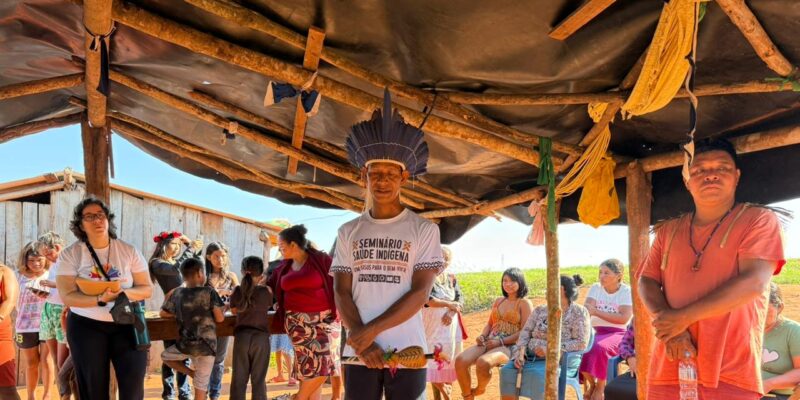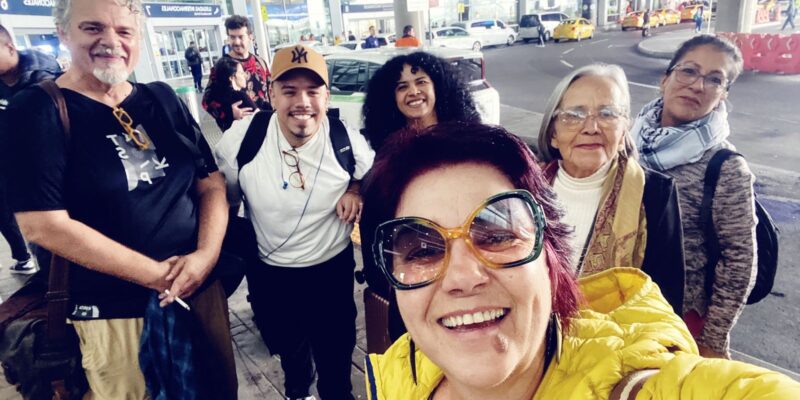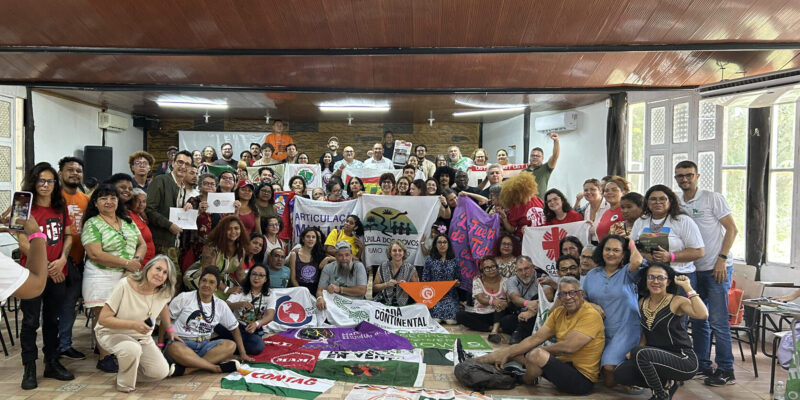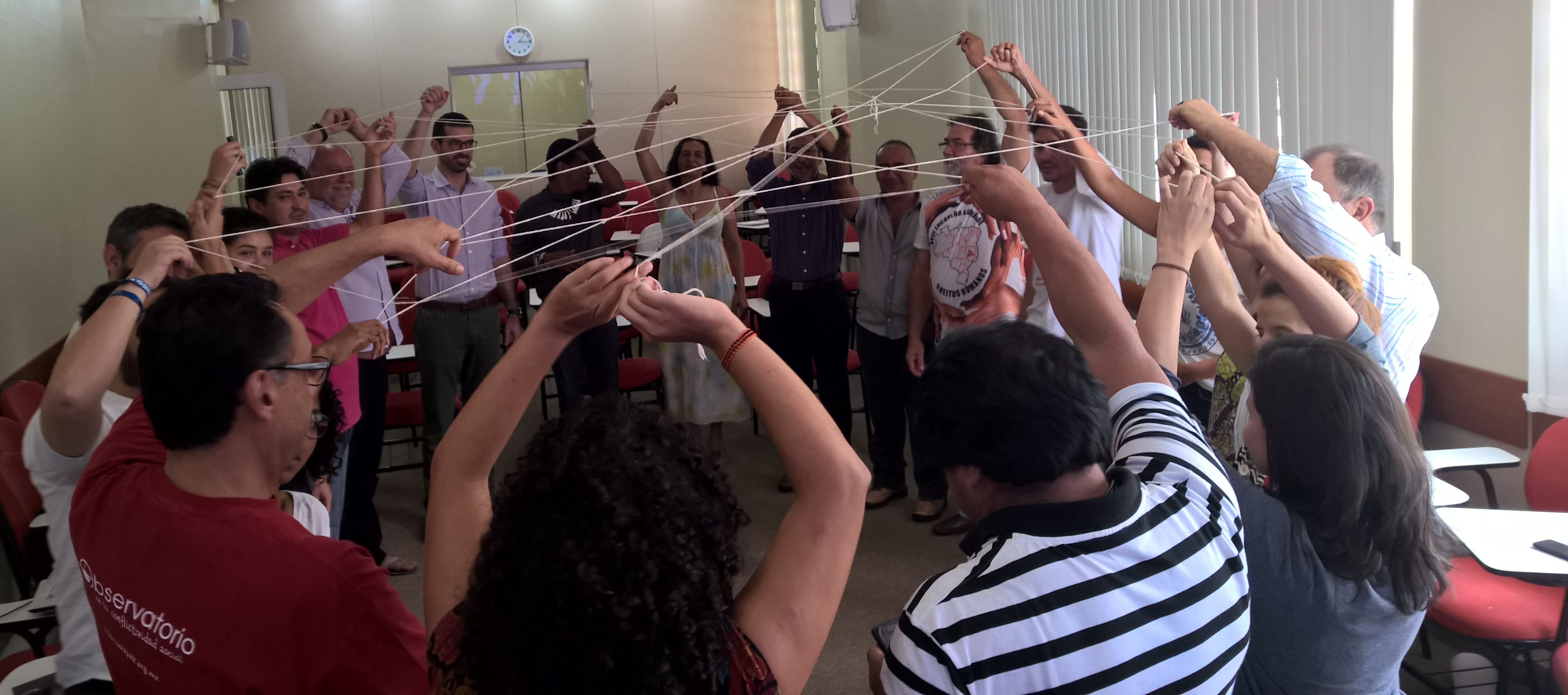
The Brazilian Commission on Human Rights Defenders (CBDDH) it is a compound by several organizations and moviments of the civil society since 2004 acts on the protection to human rights defenders in risk situation, threaten, attack and/or criminalization in consequence of their militancy. Since its inception, the Committee has been promoting and monitoring the implementation of a protection policy in Brazil and the National Program on Human Rights Defenders (PPDDH), always seeking to improve it so that it is an articulator of public policies aimed at overcoming the structural problems that generate vulnerability of defenders and social movements. In this sense, the Committee periodically elaborates letters of recommendations with the objective of pointing out challenges and obstacles to the implementation of the PPDDH, evaluating the institutionalization of the program and presenting proposals for its strengthening. The CBDDH also monitors the situation of DDHs, acting in the combat and prevention of threats, violations and processes of criminalization, a practice that has been consolidating as a serious immobilizer of the social struggle.
Knowing more, access here our Letter of Principles:
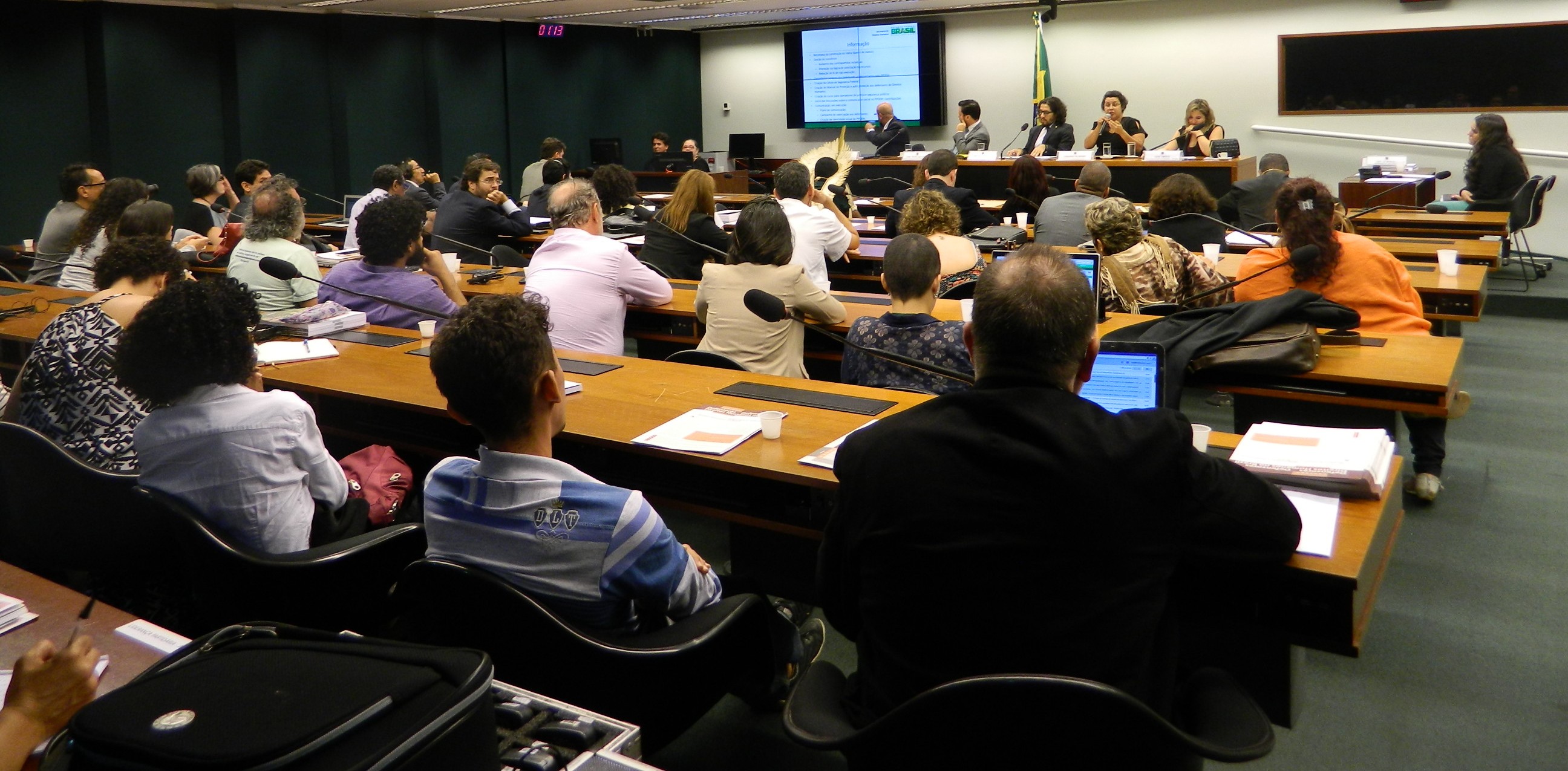
History
The Brazilian Committee of Human Rights Defenders was established in 2004, in São Paulo, during the III Latin American Consultation on Human Rights Defenders. The Consultation process in Latin America had been contributing to disseminate and strengthen the recently adopted United Nations Declaration on Human Rights Defenders (1998) and the Unit for Human Rights Defenders within the framework of the Inter-American Commission on Human Rights of the Organization of American States (OAS), established in 2001. There was also an urgent necessity of adopt protection programs in several countries in the region, including Brazil, Guatemala, Colombia and Mexico.
In Brazil, throughout the first months of the President Lula’s administration (2003), a working group was formed within the framework of the Council for the Defense of Human Rights (CDDPH), which brought together human rights organizations, of the executive, legislative and judicial powers, which have taken on the task of outlining the construction of a national program to protect human rights defenders.
It was in this process that the Brazilian human rights organizations were assigned the task of thinking about a protection policy in the country and also of organizing the III Latin American Consultation for Human Rights Defenders. Held in August 2004 in São Paulo, this Consultation was an important moment of sharing experiences among the organizations of Latin America that resulted in the formati’on of the Brazilian Committee of Human Rights Defenders (CBDDH), a network that brings together organizations and movements (DDHs) in Brazil, and its main objective was to monitor the implementation of the National Program for the Protection of Human Rights Defenders (PPDDH) in Brazil. The CBDDH, which today brings together around 30 organizations and social movements from various states, creates evaluations and recommendations on the PPDDH, follows the emblematic cases of violations committed against DDHs, and conducts and participates in training activities aimed at strengthening the struggle of the DDHs.
Who makes up the Brazilian Commission on Human Rights Defenders (CBDDH)
Among the organizations that currently make up the CBDDH are:
ARTIGO 19
ARTIGO 19
ARTIGO 19 is a non-governmental human rights organization whose mission is to defend and promote the right to freedom of expression and access to information. The name comes from the 19th article of the UN Universal Declaration of Human Rights. With offices in nine countries, ARTIGO 19 has been in Brazil since 2007, and since then it has been promoting different guidelines related to freedom of expression and information. These include combating violations of the right to protest, protecting communicators and human rights defenders at risk, and combating the criminalization of communicators, human rights defenders, social movements and other groups that use freedom of expression and information to fight for rights.
Association of Lawyers for Rural Workers in the State of Bahia - AATR
The Association of Lawyers for Rural Workers in the State of Bahia – AATR is a non-profit and economic organization of civil society, which since 1982 has been providing legal advice and training in rights within the theoretical frameworks of popular legal education to organizations and movements of the field, as well as focusing on the critical and socially committed formation of the legal operators, with Bahia as a territorial base.
Association of Child and Adolescent Support - Amencar
AMENCAR is a OSC whose mission is “act in the defense, promotion and protection of human rights” by developing programs and projects to defend and enforce rights, promote citizenship and combat social inequalities, promoting a culture of human rights through processes and emancipatory educational actions, articulating people, collectives and networks in the formulation and consolidation of public policies.
Popular Brigades
The Popular Brigades are a socialist, feminist, anti-racist, nationalist-revolutionary, militant organization for the emancipation of the oppressed peoples of the world. Aimed to develop political work together with the popular majorities, narrowing the ties and broadening the horizon of awareness and action of those and the ones who today are outside the sphere of political decision of the country.
Central of Popular Movements
The Central of Popular Movements is an organization of the popular movement founded in 1993, the result of the 1980s discussions on the need to organize a “Central” to articulate and unite the diversity of popular movements in the struggles for freedom, democracy and human rights and against political and social oppression in Brazil.
Center for the Defense of Human Rights Gaspar Garcia - SP
Center for the Defense of Human Rights Gaspar Garcia – SP
The Center for Human Rights Gaspar Garcia is an ecumenical, non-governmental and non-profit organization. Since 1988, it has worked with low-income people, specifically in the defense of the homeless people, the scavengers, and the street vendor and the movements of the homeless who fight for their Right to Housing and the City. All these groups are extremely vulnerable and in a city that survives under the logic of capital, real estate speculation, and violence, these developments are constantly violated. Thus, it is the CGGDH Gaspar Garcia’s role to defend and strengthen the struggle of these followers so that they fight for their rights and advance in the construction of public policies.
Center for the Defense of Human Rights of the Serra -ES
The CDDH-Serra seeks a society that is prized for justice, freedom, equality of conditions, respect for different cultures, human beings and nature, in an unequivocal position in favor of the EXCLUDED AND IN THE SITUATION OF RISK AND VULNERABILITY and its mission is to DEFENSE OF LIFE AND HUMAN DIGNITY, with objectives aimed at promoting activities and purposes of public and social relevance.
Feminist Center for Studies and Advice - Cfemea
The Feminist Center for Studies and Advisory Services (CFEMEA), founded in 1989 by a feminist woman who worked hard to regulate new rights for Brazilian women in the 1988 Constitution, has its history marked by the defense of women’s rights associated with construction of political, social and interpersonal relations. Based on feminist and antiracist thinking, CFEMEA actively participates in the national women’s movement, integrates international feminist networks, especially in Latin America.
In 2014, celebrating its 25th anniversary, CFEMEA decided to inaugurate a new cycle of action oriented towards the sustainability of activism, recognizing that the organization and mobilization of women is crucial for the democratization of democracy. The current institutional program of CFEMEA aims to affirm the fight for women’s rights and to support feminist activism, promoting two lines of action: a) political formation (via support for the consolidation of the Free Feminist University and Training in Action); and b) the promotion of the political dimension of self-care and care among activists.
Collective Margarida Alves of Popular Support - MG
The Collective Margarida Alves (CMA) brings together popular lawyers and seeks, through popular advice, to guarantee and enforce human rights, in a way that is supportive and collaborative with the advisory groups. In his work, the CMA uses legal tools as an instrument of social change and articulates networking. The Collective works in several areas, with a focus on structural problems of Brazilian society, with emphasis on urban occupations, affected by mining, street population, feminists, traditional communities.
Pastoral Commission of the Earth - CPT
The CPT was created in 1975 in the context of violence in the countryside faced by squatters, indians and rural worker facing the advance of the agricultural frontier in the Amazon. From this reality, she defined her mission as a “solidarity, prophetic, ecumenical, fraternal and affective presence”, which provides an educational and transformative service to the peoples of the earth to stimulate and reinforce their protagonism in their struggles for agrarian and agricultural reform and develops its actions around three main axes: Land, Water and Rights.
Indigenous Missionary Council - CIMI
CIMI is a body linked to the CNBB (National Conference of Brazilian Bishops) created in 1972, when the Brazilian State openly assumed the integration of indigenous peoples to the majority society as the only perspective. Cimi sought to promote the articulation between villages and peoples, promoting the first large indigenous assemblies, where the first outlines of the struggle for the guarantee of the right to cultural diversity were drawn. In these processes, we always strive for the autonomous construction and self-determination of indigenous peoples.
The priority action of CIMI is support the struggle of indigenous peoples and its communities for the recovery, demarcation and guarantee of the integrality of their territories. Land is a condition of life and full realization of the culture of each indigenous people. In this perspective, Cimi assumes as a flag of struggle the protection of the territories of all indigenous peoples, including those who remain without contact with Brazilian society.
Pastoral Council of Fishermen - CPP
The Pastoral Council of Fishermen is a Social Pastoral which is attached to the Episcopal Commission for the Service of Charity, Justice and Peace of the National Conference of Bishops of Brazil. With an ecumenical spirit, it is at the service of the Fishermen and Fishermen of Brazil. The CPP is composed of pastoral agents (popular educators), laity, religious men and women committed to the service of fishermen and artisanal fishers in the construction of a just and solidary society. The work of the pastoral of fishermen began in 1968, on the beaches of Olinda (PE), by Frei Alfredo Schnuettgen, OFM. Today the CPP acts directly in 10 states of Brazil and supports the struggle of the Fishermen’s Movements in several other states.
Group Torture Never Again from Bahia
Torture Never Again BA, a non-governmental organization for the defense of human rights. It was created on September 5, 1995. Originally created to rescue the historical truth of those who fell in the struggle against the authoritarian regime implanted with the military coup of 1964, having the conviction that to know and to denounce this past of horror that settled in the nation, is more than a just action in Family members who suffered the loss of their loved ones. It is a movement created of the need to respond to popular oppression, the grave violations of human rights. It is a legitimate social movement, which seeks to break the cultural and territorial boundaries to unite in the same struggle all those who believe in Life.
Institute of Human Rights - MG
The Institute HR: Promotion Research and Intervention in Human Rights and Citizenship, is a non-governmental, non-profit organization whose main objective is to contribute to the constitution of a society in which human rights are exercised in their universality and indivisibility, providing social justice and citizenship.
Created in 2007, it has as its mission “act in favor of Human Rights and Citizenship, strengthening and encouraging the integrated action of entities for the defense and promotion of rights and public agencies.” For that, it has as its main areas of activity: Education in Human Rights; Strengthening of Human Rights Networks; Public Policies and Human Rights; Prison System, Violence and Human Rights.
Global Justice
The Global Justice works with the protection and promotion of human rights and the strengthening of civil society and democracy. Founded in 1999, our actions aim to report violations; Focus on public policy-making processes, based on fundamental rights and gender and race equity; Promote the strengthening of democratic institutions; And demand the guarantee of rights for the victims of human rights violations.
Lajusa - Laboratory of Global Justice and Human Rights Education in the Amazon
LAJUSA – Laboratory of Global Justice and Human Rights Education in the Amazon is based at the Federal University of Pará, developing research, extension, formal and popular education, as well as national and international strategic litigation, in sensitive issues of rights violations, with special focus to death threats against human rights defenders in the state of Pará.
Movement of the Affected by Dams
The Movement of those affected and affected by the dam is a popular movement founded in 1989, which acts in the construction of a popular energy project for Brazil, with sovereignty and popular control and distribution of wealth. In order to do so, it has sought to defend and conquer rights for people affected by energy projects, especially hydroelectric and mining.
Movement of Landless Rural Workers - MST
The Landless Movement is organized in 24 states and the Federal District in the five regions of the country. In all, there are about 350,000 families who have conquered the land through the struggle and organization of rural workers.
Even after being settled, these families remain organized in the MST, since the conquest of the land is only the first step towards the realization of Agrarian Reform. We know that the solution to these problems will only be possible through a Popular Project for Brazil – fruit of the organization and mobilization of the workers. And we trust that the realization of Agrarian Reform, democratizing access to land and producing food, is our most effective contribution to the realization of a Popular Project.
Therefore, the MST also participates in articulations and organizations that seek to transform reality and guarantee these social rights. Nationally, we participate in the National Forum of Agrarian Reform, Coordination of Social Movements and permanent or conjuncture campaigns. Internationally, we are part of Via Campesina, which brings together the social movements of the five continent.
National Human Rights Movement
The National Movement for Human Rights (MNDH) is an organized, non-profit, democratic, ecumenical, supra-partisan civil society movement, present throughout the Brazilian territory in the form of a network of more than 400 affiliated entities. Founded in 1982, it is nowadays the main national articulation for the fight and promotion of human rights. The MNDH has its programmatic action based on the struggle for life against violence and acts in the promotion of Human Rights in its universality, interdependence and indivisibility, based on the principles established by the Charter of Principles (Letter of Olinda) of 1986.
Network Justice on the Rails
We are a network of communities impacted directly by the large mining and steel exploration projects in the ‘Carajás Corridor’ (Pará and Maranhão), which seek to defend their rights and nature, building conditions for a dignified life for the populations of the region.
Society of Human Rights from Maranhão- SMDH
The Society of Human Rights from Maranhão (SMDH) is a civil society entity founded in 1979 as a political space for denouncing agency and violence. The institutional mission is the promotion, protection, defense and reparation of human rights, with a special focus on people threatened, victims of torture and traditional communities on the fight by land and water and other vulnerable populations, based on the paradigms of popular education and protection pedagogy.
Society for Defense of Human Rights from Pará - SDDH
Founded on August 8, 1977, the SDDH – Society for Defence of Human Rights from Pará, a non-governmental, non-profit organization affiliated with the National Human Rights Movement, is now 24 years old and is among the oldest civil associations in Brazil in the struggle for democratic freedoms, prevalence of human rights and social justice. It began its activities during the period of the military dictatorship, when civil and political rights suffered a severe castration, and goods such as life, liberty, physical integrity meant little or nothing.
Specifically, he worked in the urban area denouncing police violence and establishing responsibility in crimes of serious violations of human rights; In the rural area, dedicated himself to the struggle for agrarian reform by offering legal and political advice in the violent southeast region of Pará, where he has maintained a nucleus in Marabá since 1986.
Today SDDH’s activities include the Legal Center of Marabá and the 05 departments in the headquarters in Belém: Public Security Policy, coordinating the action in CONSEP; Provita, executor of the Program for the Protection of Victims and Endangered Witnesses; Database, searching the criminalized activity in the State; Department of International Human Rights Protection (DIDH), which carries out training of human resources on the international protection of human rights, and reports of violations with international organizations; and Legal Department, representing victims of exemplary cases.
Land of Rights
The Land of Rights acts in the defense, promotion and realization of rights, especially economic, social, cultural and environmental rights. It believes in popular sovereignty and supports the collective struggles of social movements, peoples and communities, for recognition and guarantee of rights. The actions are developed in four areas: Earth, Territory and Space Justice; Human Rights Policy and Culture; Biodiversity and Food Sovereignty; and Democratization of Justice.

